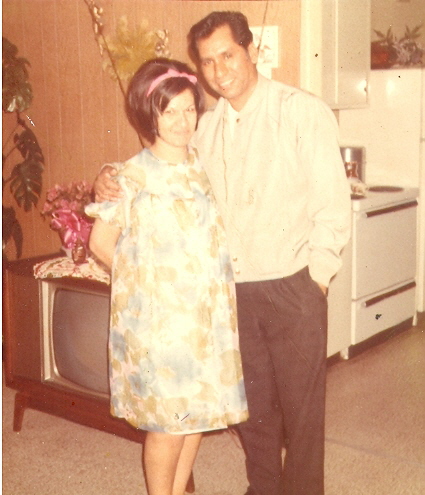Jose Maria Ayala


|
|
On September 6, 1929 in San Diego, California my grandfather Jose Maria Ayala was born and raised. He has a family that consists
of twelve brothers and sisters their names are, Severo Jr., Mike, David, Luie, Joe, Frank, Robert, Donna, Josephine, Francis, and Virginia.
He attended San Diego High School only to the 10th grade and was drafted. After coming back from the Korean War, he continued his education
and headed down to Wes Laco, Texas, to pick cotton that's where the money was at that time and being so young he moved down there. Jose met
my grandmother Guadalupe Montalvo, she too was collecting cotton and helping her family, they fell in love and got married in court and decided
to start their new life in Chicago, Illinois because they heard there was more money making jobs up there. My grandfather worked in a factory
for 24 years and my grandma was pregnant with my Aunt, Mary and 12 years later had my mom Laura. When my mom turned 17 they decided to move down
to San Antonio, Texas because they gangs and violence was just getting to bad for them to live there anymore. Ever since they have lived there
and have been happily married for 50 years. I would like to say that when this interview took place it was hard at first because I don't have a
close relationship with my grandfather and my grandfather is a very quiet man, when he needs to talk he will other than that he will sit
quietly and it seems that he is constantly thinking about everything. This interview opened up some opportunities for the relationship I can make
with my grandfather before anything happens.

How was your childhood?
My childhood? (chuckles), there was a lot of us in our family 12 total. My brothers were Mike, David, Frank,
Steve, Jose, Gilbert, and Ralph my sisters are Francis, Donna, Josephine, and Virginia. I guess I grew up like
any other kid, we had big house we all fit so I suppose we were middle class. We all had to go to school, school
was okay. We went to the movies and saw cowboy pictures with Roy Rogers and The Cisco Kids and so and so. We us
to play ball and we grew up like any other kids, going here and there doing a little mischief (chuckles).
What was your first job?
I was a truck driver, of course when I joined the army I quit. I got paid around fifty cents and hr. We all pitched
in my father was a truck driver also, my mother a house wife, my sisters worked on building airplanes.
What was the cool trend back then? What was a cool saying?
Levis, corduroy pants...and "Everything's real cool" (chuckles)
What did you want to be when you grew up?
Well let me see, I guess I wanted to be a professional baseball player. I wanted to be that when I was small
but it never happened (chuckles).
How did you hear about the war? Was it broadcasted on the radio, TV, people?
Probably the radio, yeah the radio, it was that the
Korean war
How did you join the military?
I was drafted, you would register and they would do a physical and I was A1, I was eligible to join
and they would call the numbers and they called mine.
Were any of your brothers in the military?
Yes, one was in the Navy in World War II and another was in the Air Force and another in the Marines.

Do you remember your first day of Basic Training?
Not really, I know it was kind of tough it was really cold and everything.
Were you afraid?
I wasn't, I wasn't scared. I knew that if I came back, I came back if I didn't, I didn't. There
were a lot of kids that were scared.
What were the differences in enviroments and cultures?
One thing about the Koreans I'm talking about the civilians, they were always "starched" always wearing white clothes,
they were nice people. When we got to Korea nothing was left, everything was blown up and knocked down. There was nothing to look at. The weather
was cold it was 31 degrees and it snowed, and when it rained, it rained and when it was hot, it was really hot.
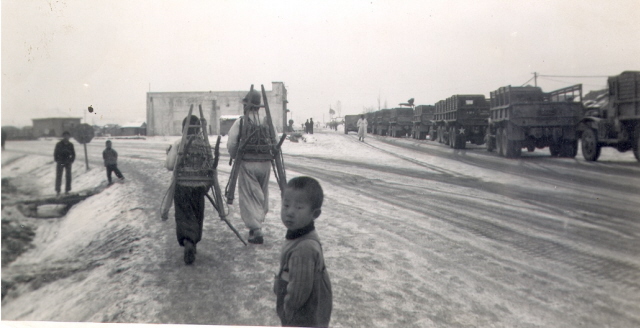
Did you take showers or where did you use the restroom?
There wasn't any restrooms out there (chuckles), in the river they put a tent and they built a shower and we would
shower every 2 weeks, but once they called at night the rain took the shower, it took everything. (laughs) I remember that
real good.
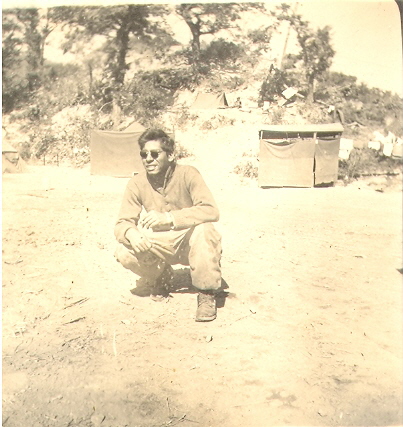
What did you carry with you in Korea?
Your rifle the M1, ammunition, and headgear that's it, you couldn't carry anything but your wallet.
What were you aloud to carry with you?
Nothing, we coudln't.
When you had free time, what did you and the other soldiers do for fun?
Actually we didn't have any free time, we couldn't go any where. We just had to be on guard and be ready for whatever happened.
I was in the 7th Division infantry.

Do you remember your friends?
yeah, this one friend of mine named Scott... (thinking to himself)
Did you know anyone who died?
No, a lot of soldiers were dying all over, none of my buddies died.
Did you almost ever die or get hurt?
Well, this one time we were walking up a hill clearing sites for the men who blew up the mines and this Korean
yelled out "G.I watch out!" and I nearly stepped on a mine, I was this close to stepping on it (shows me with his hands)
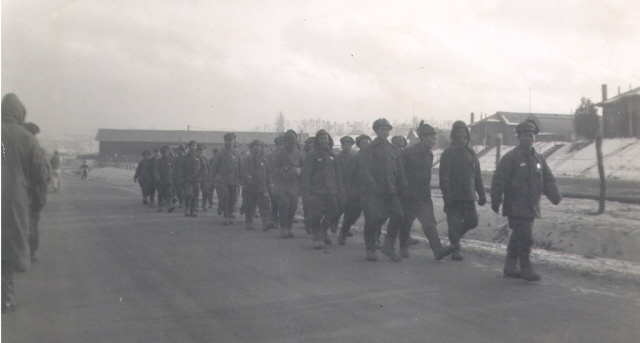
Did you ever see combat or were involved?
Well they were talking the truce, but they would fire on us and through a couple of rounds. This one time we saw 2
planes in combat a Chinese and American they were both firing rounds at each other and the Chinese plane shot the American
plane, and the guy shot out of the plane in a hurry landing on our side before his plane blew up right in front of us.
How did it feel when you came home?
Oh I was so glad, so glad it was nice coming home.
What did you miss?
(laughs)The luxuries over here in the states, family, well everyone you know. We would write each other, I would get
a letter once every month or something like that. When we had time I'd write back.
What is your most unforgettable memory?
Well uh, (long pause) that I had to go and leave everyone behind. When we left it took us 13 days to get over there
from when we left the states. Well they needed us over there so they didn't waste no time taking us, coming back well they
just took their time coming home.
Would you have gone back?
Well, if I had to I would, yes for support. The time was if you were upfront it was 9 months, if you were in the
rear it was eighteenmonths, but uh yes.
Was joining the military worth it? Did you gain or lose anything from being part of it?
Yes it was, and no not really didn't gain or lose anything, I helped them out over there and that's it.
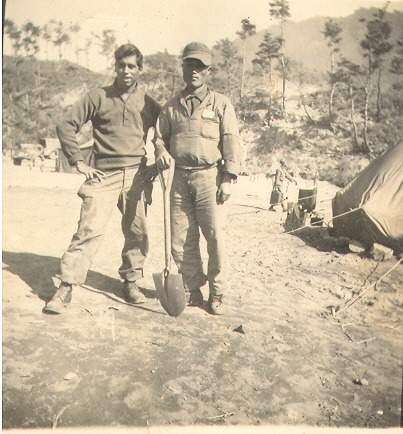
Did you almost die or get hurt?
Well, I just about stepped on a mine and this Korean yelled out G.I watch out! He saved us all.
What did you eat
We ate what they called sea portions, whenever I ate we use to eat chocolate and crackers, they tasted real good.
Is there anything you would like to add?
Like I said if they needed me I would have went back. I'm glad I went and I'm glad I came home,
I was one of the lucky ones.
